Peter MALONE
Saturday, 18 September 2021 19:48
Beauty and the Beast/ 2014
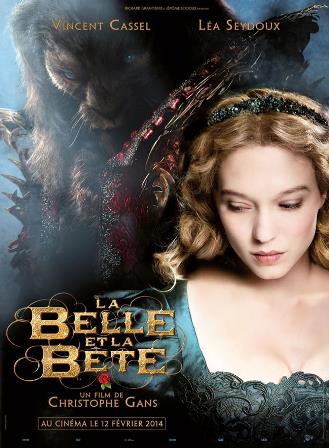
BEAUTY AND THE BEAST
France, 2014, 112 minutes, Colour.
Lea Seydoux, Vincent Cassel, Andre Dusollier, Eduardo Noriega.
Directed by Christoph Ganz.
Beauty and the Beast has been seen in many film versions.
The classic version is that by Jean Cocteau. There have been television versions with stars like George C.Scott. For the general public, the Disney version of 1992 is probably the best known.
Director Christoph Ganz (Brotherhood of the Wolf) has decided to make an adult version – even though the context is a mother telling children a bedtime story. He has relied on special effects and the film was made on the sound stages of Germany’s Babelsburg Studios. And it is quite a lavish production, in its period settings, costumes and decor. There is a sea port, taverns, homes in the country, and a huge castle on a mountain in the woods.
The film focuses on a merchant, Andre Dusollier, a merchant, whose ships are wrecked, although one survives and he has to use it to pay his debts. In the meantime he has a reckless son who is squandering his money. He searches for him in the port and comes up against a dangerous adventurer, Perducas, played by Eduardo Noriega.
On his way home, the merchant is lost in the snow, comes across a castle and finds lavish food there for him to eat. He also takes a rose for his youngest daughter, something which enrages the owner of the Castle, the Beast.
Allowed to return home, the merchcant finds his children dissatisfied with their home in the country, except for Belle, who tends the garden. She returns in her father’s place to confront the Beast. What follows is the familiar material of Belle beginning to understand the Beast, discover a great deal of his story, find compassion for him. As he allows her to return home for a day, she promises to come – or else, he will die.
Complications set in. Perducas is pursuing the extravagant brother for him to pay his debts. The brother takes Belle’s horse and rides towards the castle in order to get more jewels such as the one he found on his sister’s dress. But Perducas, who relies on a friend who is an expert tarot cards but has not revealed the full truth, goes in pursuit.
The finale consists of an attack on the Castle, its defence by two huge statues and the mysterious growths of tree limbs which can envelop people, especially Perducas. Belle is able to make her way into the castle on time, the Beast comes back to his normal appearance – which the audience has often seen in flashbacks where he is in love with his wife, goes to hunt the golden deer which his wife urges him not to because, when he kills, it it is revealed that she is the golden deer, a nymph of the forest. Hence his becoming the Beast.
The film actually ends with a happy ever after, the reader of the story being Belle with her husband outside working in the garden. Lea Seydoux is charming as Belle and Vincent Cassel is a strong beast.
1. The classic story? Fairytale? Novels? Jean Cocteau’s film, popular versions, telemovies, Disney’s animation? Audience awareness of these versions?
2. The adaptation of the novel, the Fairytale for an adult audience? It’s being told to children in the film?
3. The re-creation of the period, costumes and decor, the port, the ships, the ships at sea, the snow scapes, the city taverns, the isolated castle and its surroundings, the interiors? The special effects, make up, the Beast, the giant statues, the action? The lush score?
4. The story and the variations? From the focus on the children in the family, to the family story and the merchant, to Belle’s story, to Beast, to flashbacks, to disaster, to change and the finale?
5. The merchant, his wealth, his children, the ships, the storm and their being lost, one saved? His forfeiting the wealth to pay his debts? His wastrel son, the other sons, one to take over the business? His daughters, frivolous and superficial? His love for Belle?
6. The mother telling the story, the narrative throughout the film – and the revelation that the mother was Belle, and her husband working outside the house in the garden?
7. The father, seeking Maxime, in the tavern, the owner warning him, Perducas, his vengeance, the woman and the tarot cards, not revealing the full prediction? The father escaping, riding home, the snow, lost, the horse falling, his finding the castle, the food ready, taking the rose? The confrontation with the Beast? The challenge? His being able to leave but the obligation to return?
8. His return home, the relief of the sisters, the brothers, Belle? Belle settling into the new house, the others wanting to leave and go back to the city? Belle and her garden? Her decision to return to the beast?
9. Belle, the encounter with the beast? Her fears, yet her courage? His appearance, his words? The threats? The interaction between the two? Her learning more about him, seeing the images, the mirrors, the flashbacks and the story of the beast, as Count, his friends, hunting, the issue of the golden deer? His wife, love, his devotion, his pride that she was pregnant? Her warnings about the deer?
10. Belle and her learning more about the Beast? More sympathy? More understanding? The shooting of the golden deer, the discovery that it was his wife, her explanation about being a nymph, her grave? And his transformation?
11. Belle, being allowed to return home, the necessity for her coming back? If she did not, he would die?
12. Her return home, the reaction of the family, her father in a kind of coma, the sisters, the brothers?
13. Belle’s red dress, the jewels, Maxime and his taking the jewel, to pay his debts? Going to the castle to get more? The arrival of Perducas? His pursuit, his greed? The woman and the predictions?
14. Getting to the castle, the two statues, the attempts to destroy them, the statues coming apart? The forest and the growing limbs? Enfolding them? The destruction of Perducas?
15. Belle, Maxime taking the horse, her trying to get in, her arrival, the collapse of the Beast, the Beast, her expressions of love? His revival?
16. And Belle telling the story to her children – and the happy ever after ending?
Published in Movie Reviews
Published in
Movie Reviews
Tagged under
Saturday, 18 September 2021 19:48
Land of Storms/ Viharsorok

LAND OF STORMS/ VIHARSOROK
Andras Suto, Adam Varga, Sebastian Urzendowski.
Hungary, 2014, 106 minutes, Colour.
Directed by Adam Csaszi.
Land of Storms begins like a sports film, a coach with the pep talk for his team, playing in Germany. They train, they communicate in the dressing room, in the showers, they watch pornography in the dressing room… The focus is on the Hungarian player who is good at football, but it is later revealed that the reason that he is playing is because of his father and his father’s big career.
In a shower sequence, the player begins a fight with his roommate, alleging that he is looking at him. This suggests that there will be sexuality themes in the film. And, indeed, they become the main subject.
The player goes home to Hungary, sets up in a farm that he has inherited, trying to manage by himself and thinking to repair it and to keep bees. One night, his motorbike is stolen but he pursues the thief and confronts him. The thief is a young man from the village, doing a trade apprenticeship, living with his mother and caring for her. He returns and offers to work on the repairs with the footballer.
The audience is not thinking that the footballer has a homosexual orientation but it manifests itself in his encounters with the young man. And the young man is bewildered, liking what he has experienced, but finding it, in the context of his very religious village, something that he cannot deal with. In a moment frankness, he tells his mother who actually informs the young men of the village with whom he plays football. The young man is a churchgoer, devoted to his mother, but when he is beaten up and burnt by his friends, he leaves his mother and goes to live with the footballer.
In the meantime, the footballer has communicated with his friend in Germany who then comes to visit. This makes for emotional complications, the visitor wanting to stay with the footballer, the footballer feeling that he should stay with his workmate because of what he has suffered. For a while, it seems that the three manage together but eventually the visitor returns to Germany.
Up till the final moments of the film, we assume that it is a sympathetic look at two men, their attraction, the relationship, gay sexuality. But in the final moments, there is a hugely melodramatic turn and we realise that this is a film against homophobia, as manifested by the mother, by the friends in the village, and by the young man himself who cannot deal with his own sexual orientation and attacks the man he loves. This means that the audience leaves the theatre jolted by these realities of homophobia.
1. The title? Weather? Emotional storms?
2. The Hungarian locations, the village, the isolated farm, the church, homes, the flat terrain?
3. Szabolcs and his playing football, the overhead view of the pep talk, the strong words of the coach, training, the locker room, games, Szabolcs not succeeding? The reaction of the coach, whether he should stay or not?
4. The camaraderie of the players, the shallower sequence, Bernard and his looking, the fight? The players watching the pornography on the television? The spirit of the group? The indication of the sexuality themes?
5. Szabolcs and his decision to return, the plane, the training, walking to the isolated farm? The transition from Germany to Hungary? His inheritance, the mess of the house, his decision to stay, washing outside, eating, sleeping? His bike? The thieves and his catching Aron?
6. Aron, his age, his apprenticeship, stealing the bike? Living with his mother, his care for her? The friendship with Brigi, kind-of girlfriend?
7. The friends in the town, their gatherings, playing soccer? Szabolcs and his playing with them? Their critical attitude towards him?
8. Aron, his helping with the house, the tiles, the beams, the work, the payment?
9. Szabolcs going to visit his father, his father’s career, the pressure on him to play football? The slap, love between father and son, preparing the big breakfast? The decision not to play or return to Germany? The later visit of the father, seeing the two men together, upset, driving into the countryside – and letting his son out and go back to his life?
10. Szabolcs and Aron, the bike rides, sleeping, Szabolcs’ approach to Aron, feeling him? The sexual encounter in the house? Aron’s reaction?
11. Aron telling his mother, his mother telling the others, the bashing and the burning? His attacking his mother? Her illness, going to hospital?
12. Bernard, the friendship in Germany, the sexual tension? Szabolcs bringing him, his coming to visit, his hopes? Staying, the talking, the bond, the sexual link? The touring the area?
13. Aron and his being upset, telling his mother that this was what he wanted, his return to the house, discovering Bernard, the three going swimming, the image of the three together?
14. Bernard, urging Szabolcs to make a decision, to leave? Szabolcs not leaving, his work with the bees, defending Aron, sense of protection? Bernard leaving?
15. Aron and Szabolcs, the sexual encounter, the sudden sight of blood, Aron killing his friend?
16. Aron, running, with the knife, uncertainty and the film suddenly ending?
17. The gay themes, sympathy for the relationships? Gay rights? Homophobia in the village? The ultimate homophobia with a Ron and his denying his
urges and killing the Szabolcs?
Published in Movie Reviews
Published in
Movie Reviews
Tagged under
Saturday, 18 September 2021 19:48
Macondo
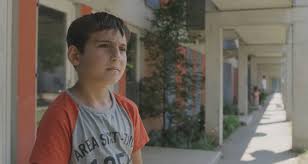
MACONDO
Austria, 2014, 98 minutes, Colour.
Ramasan Minkailov, Aslan Elbiev, Kheda Gazieva.
Directed by Sudabeh Mortezai.
Macondo is an impressive and often moving film. It is set in the Simmering district of Vienna, near the airport, the motorway and the river, Danube. Within it is the district of Macondol, with 3000 inhabitants from 22 different countries. The characters in this film are from Chechnya, war refugees, and from Somalia.
The documentary director Sudabah Mortezai (Children of the Prophet) moved into the district and had auditions for the central role, opting for amateurs rather than professional actors. 11 year old Ramasan Minkailov is completely credible in the central role of the boy who has to support his mother, idolises his father killed in the war, having to care for his two rowdy sisters.
One of the problems for the refugees is that the authorities advise that they should have evidence of the father’s death so that they can receive benefits from the state. There is no death certificate. Another difficulty is that Ramasan gets involved with some of the rougher boys in the district, going out at night, entering into a construction site, being pursued by the police.
Yet, Ramasan is a fine boy, if only he had the support and the opportunities. These come with a man who claims to have been a friend of his father, bringing the father’s watch for Ramasan. At first he is like a father-figure to the boy, but the boy is still wary and becomes more alienated from the man. When Ramasan is caught by the police and interrogated, the man offers an alibi but Ramasan turns on him and calls him a liar.
In a final interview, a supervisor approves the state of the apartment, is satisfied with the family’s behaviour and it seems they will be allowed to stay. After this, Ramasan goes to the man’s house but is ignored. He later returns again while the man is fixing the radio and he begins to help him… Good ending to the film, a happy ending, but not emphasising or over-emphasising it.
The film offers interesting insights into the plight of refugees, difficulties with authorities, the pressures on them to conform so that they will be able to stay in a country.
1. The title, the district of Vienna, the confined population, apartments, parks, school, stores? Realism?
2. The district, the refugees from Chechnya, from Somalia? Coexistence? Peaceful, some racism?
3. The authorities, asylum hearings, interviews, the need for strong evidence for an acceptance? The mother and Ramasan going to the interview? No death certificate? The supervisor, discussions about Ramasan’s discipline, the inspection of the house?
4. The background of the war in Chechnya, the Russians, the revolution, deaths? Refugees? The post-war situation, the mother phoning her family?
5. Ramasan at 11, the boy’s performance, the shrine to the father in the house, the sword in the photos? Ramasan not having any memories? His love for his mother, work at home, the burning saucepan, consulted his mother? The young sisters, their always fooling around? At the supermarket? A blend of the serious, playful? The Somali boy – and the racist comments? The friends, playing football, getting into mischief? his prospects?
6. Asi, the visit, his bringing the photo, the father’s watch? Ramasan’s response? The issue of the werewolves in the woods, getting the sofa, Asi pointing out the fear of werewolves when the family was escaping? Asi and his ability to fix things? The hairdryer? Talking with Asi? A possible father-figure? And the failure?
7. The watch, Ramasan wanting to get it fixed, the cost of the battery, tempted to steal the battery? His later stealing the tools, in the sister’s backpack? His being apprehended, the interview with the supervisor?
8. The community, the dancing, Asi and his mother?
9. The attack on Asi, saying that he was not his father?
10. The mischief at night, the boys being caught, the owner of the construction site, the policewoman? Asi intervening, giving Ramasan and other by? Ramasan’s look, denying it? Asi being taken?
11. Ramasan, his moods, his rage? At school, friendship with the Somali boy, their drawings? Football? The inspector coming to the house, everything in order, the possibilities for staying?
12. Ramasan and his going to Asi, Asi shutting the door? The reason for Ramasan’s behaviour, jealousy, preserving his father’s memory? Seeing Asi as an inadequate father-figure?
13. Going to Asi’s house again, Asi fixing the radio, Ramasan helping him? An appropriate ending? What was the audience left with? The future of Ramasan, Asi, his mother?
Published in Movie Reviews
Published in
Movie Reviews
Tagged under
Saturday, 18 September 2021 19:48
Out of the Inferno
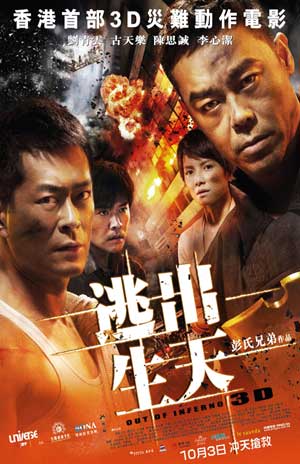
OUT OF THE INFERNO
China, 2013, 100 minutes, Colour.
Directed by Oxide Pang, Danny Pang.
When audiences think of a disaster film with a skyscraper on fire, they tend to think of The Towering Inferno. And they are right. However, The Towering Inferno was released in 1974, quite a time ago. Perhaps it is time for another towering Inferno film.
This one was made in China, situated in Guangzhou, quite a business city and centre in southern China.
The directors were the Pang Bros, responsible for some dramas set in Thailand, like Bangkok Dangerous, as well as some horror films. With this one, they show that they are able to work on a large scale, with a big cast, and with spectacular special effects.
We are introduced to two brothers at the beginning of the film, one opting to stay with the fire department, the other, the younger, going to a business company which specialises in technology to prevent fires.
4 years pass. The older brother is married, his wife pregnant, but he is dissatisfied in himself and not supportive of his wife, even to going to see an ultra-scan with her. The younger brother is quite an executive and is on his way to a launch and a party celebration on the 40th floor of a new building. By chance, he meets his sister-in-law, on her way to the ultrasound, as he enters the building.
A worker is careless with a cigarette butt and throws it down, still alight. The sparks carry upward and soon the building is ablaze. Publicity notes indicate that the Pang Bros used real fire to create a sense of dread, fear and danger for the cast.
What follows is the expected panic, the saving of people, the use of new technology to fight the fire, some characters in danger, two young men stealing diamonds and killing the owner of their shop, the older brother leading the rescue but not taking his wife out first and the younger brother has to lead a lot of people to safety, even their swimming underwater, reminiscent of The Poseidon Adventure.
As a disaster film, Out of the Inferno is very watchable. However, it is surprising that the bloggers on the IMDb are generally quite negative towards the film.
The wider audience will probably enjoy it a great deal. (There are some warnings, especially with the careless worker and the cigarette butt but also an entrepreneur stocking dangerous chemicals, illegally, on the floor which is the refuge room.)
1. A different film from the Chinese film industry? The industry in the 21st century? Local stories, international genres?
2. The Pang Bros and their career? Action and adventure? Horror?
3. Memories of The Towering Inferno and The Poseidon Adventure? The American disaster films of the 1970s?
4. The directors, using real fire, for its effect on the cast, dangers and action?
5. The plot, realism, credibility? Contrivances for fictional situations and for excitement?
6. The opening, the simulation, the vast fire, the test, the group failing, the chief and his two sons, asking their choices about their futures, one wanting to leave and pursue ambitions? The other remaining to help people?
7. Four years passing? Tai Kwan and his wife, her pregnancy, the tension between the two, his seeming disinterest, the feelings of the wife? Going to the doctor, the joy of the ultrasound, the doctor criticising her husband? Her meeting Keung, talking with him, his going to his meeting, his speech, the new technology, pride, hopes? His girlfriend being there, proposal?
8. The workmen, the cigarette, thrown away, the sparks and their going upwards, the beginnings of the fire, its spread, the explosions? The dangers? The different floors? The shop and the jewellery, the father and the little girl, telling her to stay, going back, his wife, the crowds trying to leave? The room for safety?
9. Keung, coping, his girlfriend, organising the group to leave? Meeting his sister-in-law, his assessments, advising people to go up? His rope, going up, injuring his hand smashing the glass? Lifting the group up to the upper floor? The flashbacks to Tai Kwan, their father, in the institution, the decision to save him or not? The big crane, getting people across, the thief, his brother falling, risking everybody’s life? his apology? Saving Tai Kwan? Continuing to help? His falling down the lift shaft, the water, his ideas for safety?
10. Tai Kwan and his wife, his not rescuing her immediately, yet his promise to save her? The crane, the little girl, her mother, the falling roof, his being hit, lifting for safety? The lift shaft, his risks, plan, people thinking he had died, his surviving? His wife and the miscarriage, growing in love for her husband, not necessarily wanting him to resign?
11. The thieves, bashing their boss, his death, the body in the fire? The fears, the younger brother, wanting to take the diamonds back? His falling? Ho risking people’s lives? Apology?
12. The couple, the search for their daughter, reflecting on the shop, wanting their child, the return, the little girl going off with the crowd? The mother, the poison and its killing the father? Mother and daughter and reconciliation, the falling roof, Tai Kwan and the others rescuing them? Climbing down the ladder, escape through the water? The doctor, the argument with Tai Kwan’s wife about saving the child or not? Is rationalisation that he was a doctor?
13. The father and son, the rescue, the tracheotomy?
14. Tai Kwan’s wife, glamorous personality, dignity, her injuries, pregnancy, meeting her husband again, the endurance, saving the little girl, going through the water? The miscarriage and the reconciliation?
15. The picture of the firefighters, the squads, the techniques, rescuing, the crane?
16. The chemicals and their exploding in the safety area?
17. Human courage, change because of risks and dangers?
18. Issues of responsibility, the authorities, the irresponsibility of the worker and his cigarette? The importer and his having the chemicals there unlawfully?
19. The popularity of disaster films? The quality of this production?
Published in Movie Reviews
Published in
Movie Reviews
Tagged under
Saturday, 18 September 2021 19:48
Romeo and Juliet/ 2013
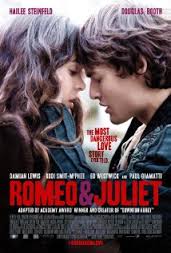
ROMEO AND JULIET
UK, 2013, 115 minutes, Colour.
Douglas Booth, Hallee Steinfeld, Paul Giammati, Damian Lewis, Natasha Mc Elhone, Stellan Skarsgaard, Kodi Smit Mc Phee.
Directed by Carlo Carlei.
Romeo and Juliet has been told many times in film. It was a star vehicle for Leslie Howard and Norma Shearer, at an age much older than that of Shakespeare’s protagonists, in the 1930s. The version in the 1950s with Laurence Harvey and Susan Shentall is not so well remembered. This is in contrast with Franco Zeffirelli’s celebrated version, with Nino Rota’s, in 1968, with Leonard Whiting and Olivia Hussey. Quite a different tone in Baz Lurhman’s Romeo+ Juliet in 1996, a modernised version.
This interpretation takes us back to the Renaissance era, the time of the writing of the play. Visually it is most impressive, capitalising on the art and architecture of the period.
The play has been edited by Julian Fellowes (Gosford Park, Downton Abbey). He has shorn the text to fit it into a running time of under two hours, he has also added some ‘Shakespearean’ lines of his own.
The main difficulty with this version is in the performances, especially that of Hailee Steifeld (strong in her Oscar-nominated role in True Grit). She does not look quite the part and her delivery is not very good indeed. Douglas Booth is Romeo, who has a striking screen appearance and is certainly better in his lines than Juliet.
Damian Lewis is interesting as Capulet and Natasha Mc Elhone very good as Lady Capulet. Also effective is Stellan Skaarsgard as the Prince of Verona. And Paul Giamatti is Friar Laurence.
The film was directed by Carlo Carlei whose other credits are very varied, including the dog comedy, Fluke, and the biography of Padre Pio.
1. The popularity of Shakespeare’s play, audiences knowing the characters and plot, the adults?
2. The variety of interpretations on-screen: the 1930s with older Norma Shearer and Leslie Howard, the elegant 1950s film with Laurence Harvey, Zeffirelli’s 1960s film with Nina Rota score, Baz Luhrman’s 1990s contemporary interpretation? This film’s 21st-century interpretation? And the derivatives from Shakespeare, from West Side Story to Gnomeo and Juliet?
3. For the 21st century, the text and its being pruned and added to? The effect?
4. The brisk pace, editing?
5. Locations, Italy, Medieval and Renaissance, art and architecture? The musical score and its tones?
6. The performances? Douglas Booth, his age, handsome, strong, sculpting and art? His being a fighter, the Montagu’s ethos? Hailee Steinifeld as Juliet? American, her presence, age, attractive, the delivery of her lines?
7. The Montagus and Capulets? The two sets of parents and their clashes? Street fighting? family at home, supportive of their children? The plans for Juliet’s wedding, to Paris, the parties, the pressures on Juliet? The play’s emphasis on the Capulets rather than the Montagus?
8. The prince, his status in Verona, the introduction, his observations about the fights, the hearings? The laws? The later judgement on Romeo and exiling him? The end and his role in reconciling the families?
9. The youngbloods, the 16th century Jets and Sharks? Wanting to fight, their angers? Tybalt and his strength? His wanting to be a controller, always challenging? The fight with Mercutio? Romeo and his revenge in killing Tybalt? Mercutio and his character, the Mad Mab speech? The role of Benvolio? Cousin? Very young, a kind of wisdom, acting as ago-between?
10. Capulet and the invitations to the party, sending out the messenger, his inability to read, asking Romeo, Romeo discovering the party, his going with Benvolio, Tybalt seeing them and his being upset? His fears for Juliet?
11. Romeo and his glimpsing Juliet, the masks, the dance, the meeting, the interchange of the sonnets, falling in love, Romeo going home, exhilarated, climbing the wall? The classic scene with Juliet as the light…, wherefore Romeo.., parting is such sweet sorrow?
12. The character of the nurse, her devotion to Juliet, her confiding in the nurse? Her mother’s hard stances? His her father’s abrupt coming into the bedroom, expecting her to marry Paris, his demands, threats of disowning her?
13. Friar Laurence, working the garden, the idea for the marriage, Juliet coming to confession? The nurse organising this? Permission? The marriage ceremony? Friar Laurence and his knowledge of potions and poisons?
14. Romeo killing Tybalt, the Prince and his judgement, exile to Mantua? Juliet upset and disbelieving? The comments of the nurse?
15. The issue of the messages, the novice going to Manchu and stopping to help the ill child? Benvolio seeing Juliet dead, immediately going to Mantua, returning with Romeo?
16. The funeral, lying in state? Juliet and the potion, her reviving?
17. Romeo finding the apothecary, getting the poison, taking it, kissing Juliet, Juliet coming to life, the kissing, Juliet stabbing herself?
18. Friar Laurence, his dismay? The funeral, the comments of the Prince, wanting reconciliation, clasping hands? Benvolio going to Romeo and Juliet and
joining their hands?
19. How effective an experience of Romeo and Juliet in the 21st century? Critical harshness?
Published in Movie Reviews
Published in
Movie Reviews
Tagged under
Saturday, 18 September 2021 19:48
Whistle Stop
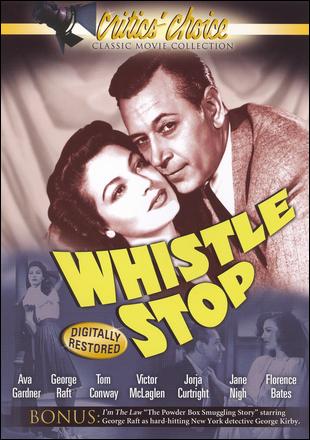
WHISTLE STOP
US, 1946, 84 minutes, Black and white.
George Raft, Ava Gardner, Victor Mc Laglan, Tom Conway, Florence Bates, Charles Drake.
Directed by Leonide Moguy.
Whistle Stop is a little-known film noir of 1946. It is a star vehicle for George Raft in his early 50s, playing the kind of role that he always played. It is also a star vehicle for Ava Gardner who was about to become a star at MGM with such films as The Hucksters. Tom Conway who had been appearing as The Falcon is the suave villain. Victor Mc Laglan does his usual rough role as a barman. Florence Bates, usually up-market and haughty, is the down-to-earth mother.
The screenplay was written by Philip Yordan who went on to write much better screenplays. The trouble is in the casting, the credibility of Ava Gardner, looking beautiful, actually being in love with George Raft.
The film, of its time, is really just a curiosity item.
1. A little-known film noir of the mid 1940s? Interest and entertainment value?
2. The US after the war, the small towns, hopes for better life in Chicago? The black and white photography, homes, the town, railway station, clubs? The county fair? The musical score? The song?
3. The title, the town as a whistle stop? The people stuck in this kind of town? Kenny, lazy, gambling? Lew, entrepreneur, owning the club? Making money? Mary, her life in the town, going to Chicago?
4. The focus on Mary, Ava Gardner at this stage of her career, just before stardom? Her beauty? Screen presence? Her arrival, the mink coat, going home, being welcomed? Kenny coming back? The past relationship? The flashbacks of the relationship? His edginess, wanting to know how she succeeded? The on-and-of relationship after her return? Her relationship with Lew? His devotion to her? Not reciprocated? Being tangled in the affairs of the club? The planned robbery? The murder? Her going to the police? Saving Kenny from being present and giving him a way out with the police? Going off with him at the end?
5. The focus on Kenny, George Raft and his career? In a small town, gambling, antagonism towards Lew? At home, mother? In and out of the club, his being banned? His love for Mary, yet his manner, Gitlo persuading him to participate in the robbery, the discussions? His backing out? Mary’s support? With her at the end?
6. Lew, suave, his manner, at the club, his staff, the county fair, the amount of money he took in? Antagonism towards Kenny, towards Gitlo, his driving, the train, the plan? The murder of the bouncer? His framing Kenny and Gitlo? His shooting kept low, Gitlo choking him?
7. Gitlo, friendship with Kenny, playing cards, his explanation for the robbery, it’s not happening, the setup, blue shooting him, his killing Lew?
8. Ernie, his engagement, the girl and her liveliness, his wondering about her family? The preparation for the wedding?
9. The mother, welcoming, care for Mary, praising Kenny?
10. The screenplay and the construction of events? The credibility of Ava Gardner, 24, in love with George Raft, 51?
Published in Movie Reviews
Published in
Movie Reviews
Tagged under
Saturday, 18 September 2021 19:48
99 River Street
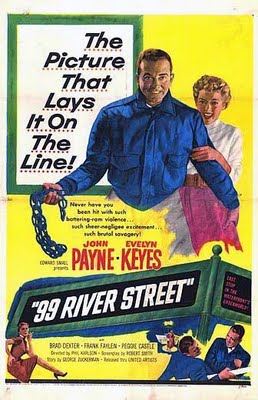
99 RIVER STREET
US, 1953, 95 minutes, Black and white.
John Payne, Evelyn Keyes, Brad Dexter, Peggy Castle, Frank Faylen.
Directed by Phil Karlson.
99 River Street has a strong reputation as a film noir of the 1950s, a high point in the long career of director Phil Karlson. It has a tough boxing opening where the protagonist, John Payne, has an eye injury and has to retire, driving a taxi. His wife, a former showgirl, had Broadway ambitions but is angry at how she finds herself with a man she considers a loser. She teams up with a diamond robber which leads to her death.
There is an assorted group of characters in the criminal world, especially diamond robbers, fences, makers of false passports.
John Payne is strong and vigorous in the central role. He is matched by Evelyn Keyes as an actress who wants to star on Broadway as well, and there is a quite persuasive scene, with a twist, where she engages Payne’s help because she has killed a producer. However, this is a stunt to prove that she really has acting talent and the audience is surprised when it turns out this way.
In the meantime, Payne’s anger overflows as he confronts a diamond thug, a suave robber, but he needs him alive as a witness to his innocence of his wife’s death.
This film noir stands up well in comparison with others of its time.
1. A film noir of the 1950s? Its strong reputation?
2. The work of the director, tough films? Black and white photography, the American city? The boxing world, the gyms? Apartments? Taxes and headquarters? Restaurants? The theatre? Realism? The musical score? The strong cast?
3. The complexity of the plot?
4. The introduction to Ernie, the desperate about, his eye, the injury, his being banned from fighting? Years passing, his anger? His love for Pauline? Her complaints about her life? Driving the taxi? His discovery of the relationship between Pauline and Rawlins? His rigid with Linda, her request, the story of the murder, going to the theatre, his desperate response, his anger at the truth, her apology? The theatre people and their exploiting his lines and his reaction? His friendship with Stan, advice, work with the taxis? Going to the apartment for Rawlins, the man with the gun, the bashing? Getting the information, some Detective work as to where Rawlins was? Christopher and his plan? The role of the police? His fighting the thug, Pauline’s body on the taxi? The fight with Rawlins, wanting him as a witness for his innocence? His decision not to fight after his visit to the gym, owning the garage, calm, with Linda and Stan? The future?
5. Pauline, a show girl, her hopes, her marriage, Ernie as famous, the years after, her verbal attack, going to work, the affair with a woollens, the plane, the diamonds, Christopher and his disdain, anti-women, Rawlins killing her, putting her body in the car, trying to frame Ernie?
6. Linda, her friendship, her hopes of the theatre, going to the interview, the return, the story of the murder, Ernie responding? Her performance? Her getting the part? The company wanting publicity from Ernie?
7. Christopher, the diamonds, his thug associate, anti-women? The plan, with Ernie? The police and the shootouts?
8. Rawlins, smooth, his plan, with Pauline, the diamonds, going to the restaurant, getting his passport, going to the ship, the fight with Ernie?
9. Stan, friendly, his support?
10. 1950s noir slice of life?
Published in Movie Reviews
Published in
Movie Reviews
Tagged under
Saturday, 18 September 2021 19:48
LIttle House, The/ Choiisai Ouchi
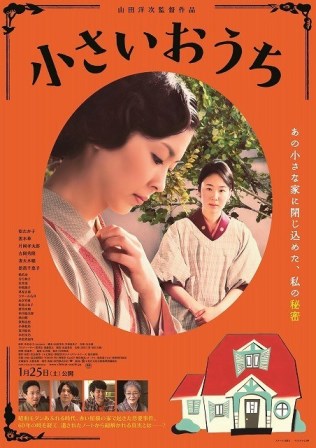
THE LITTLE HOUSE/CHIISIAI OUOCHI
Japan, 2014, 137 minutes, Colour.
Haru Kiroki, Takako Matsi, Hidetaka Yoshiaka.
Directed by Yoji Yamada.
The Little House sounds a rather twee title for a film about Japan in the 1930s and 40s. Yet, it is a quiet and rather restrained film about people who lived during that era.
The film opens in the present, a funeral for an elderly lady. Her relatives, especially a grand-nephew, go through her things and find her diary which the nephew had urged her to write. There are flashbacks to the events in the diary, often with a return to the sequences where the lady is writing and the nephew is working with her.
From a provincial town, rather plain, not expected to marry without effort, she goes as a maid to a family in Tokyo where she is were very well received, becoming part of the family. On the surface, all is well. However, the wife of the family is attracted to a young man, a worker in her husband’s company. She begins an affair with him, noticed by some of the neighbours, but not by her husband. The family have plans to find a wife him as well as for the maid. The maid herself is attracted to the young man who is unable to go for war service because of his eyes. As the war grows more severe, not seen on screen until the final firebombings of Tokyo, he is drafted for service.
When the Japanese suffer privations during the war, it seems inappropriate for a family to have a maid, and she returns to her family.
The nephew and his girlfriend discover that the young man had written a book and that there is a museum in his honour, 20 years after his death. They investigate and discover the old man who is the young boy of the family and who knew the maid well. They give him an unopened letter that his mother wrote at the instigation of the maid to the young man - but it was never delivered.
There is a beauty and gentleness in the presentation of these themes, and some self-criticism of the Japanese and their warlike attitudes and presumptions for World War II.
Haru Kiroki won the best actress award in Berlin, 2014.
1. Traditional Japanese films? Contemporary Japanese films? The intercutting of both styles? The memories of the 1930s and the 1940s?
2. The title, the Tokyo house, the exteriors, interiors? Tokyo in the 1930s? The contrast with the 21st century, the town, the seaside town? The musical score and its romantic tone?
3. The opening with the funeral, the family at the station, talking, the introduction to the aunt? Cleaning up her house, discovering the manuscript and
reading it?
4. The scenes of the aunt writing the manuscript, Takeshi encouraging her, reading it, his visits, the meals, fixing things for her, her effort to him, comments on his life, cooking, her tears and remembering? Into cutting these scenes with the flashbacks?
5. Her story, 1935, a plain girl, no prospect of marriage, going to Tokyo to be maid? The welcoming family? Tasks? Place within the family? Everybody referring to her as dear Taki, her close friendship with Totiko, with her husband, the son? The family and the Company and loyalties? Mr Itakuro and his work, the company, his visits, the family wanting him to marry, providing him an album of photos? Is choosing not to marry? Totiko and her kiss, visits to his apartment? The cup of tea, not having it? The downstairs people noticing, gossiping? His not being able to go to war, is site and health? The desperation of the later draft? His visit? Totiko and the gossip? Wanting to visit him? Tuckey inviting her to write the letter, are not taking it? Totiko waiting?
6. Mr Itakuro, his appearance, his visits, chats, playing with the boy and the plane, the attraction to Totiko? To Tuckey?
7. The husband, preoccupied with the company, not noticing what was going on with his wife?
8. Tuckey, work, polite, the issue of the arranged marriage, the visit of the prospective suitor and his sister, elderly, rejected?
9. The background of the Japanese occupation of China, the references to it as an incident? The hostility towards the US? The impact of Pearl Harbor? Japanese suffering, rationing, hard life, maid seeming to be an objectionable choice, the bombing of Tokyo, the destruction of the house with the firebombs, the atomic bombs?
10. Tuckey, her going home, alone, living her long life, a regrets?
11. Takeshi and his discovering that Mr Itakuro had written a book, his paintings, his museum? The visit Western Mark the discovery of Totiko’s son, going
to visit him, giving him the unopened letter, his realisation of what had happened?
12. A Japanese experience?
Published in Movie Reviews
Published in
Movie Reviews
Tagged under
Saturday, 18 September 2021 19:48
Two Men in Town
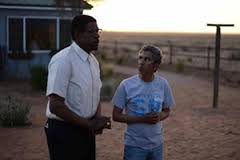
TWO MEN IN TOWN
US, 2014, 115 minutes, Colour.
Forrest Whitaker, Brenda Blethyn, Harvey Keitel, Ellen Burstyn.
Directed by Rachid Bouchareb.
To Men In Town is from Paris-born director, Rachid Buchareb. He has made some fine films, including two with SIGNIS and Ecumenical awards: Little Senegal and London River. However, this film is not as good, even though the director does create an interesting New Mexico environment.
The film is an American adaptation of the 1973 thriller, Two Men in The Town, based on the work of novelist and director, Jose Giovanni, who had himself experienced French prisons. The original starred Alain Delon, Jean Gabin, Michel Bouquet, with Gerard Depardieu in a supporting role.
It is difficult to pin down who the two men of the title are. One should be thea central character William Garnett, played with his usual Intensity by Forrest Whitaker. On the other hand, he interacts with two men in the town: the sheriff, played by Harvey Keitel, and the Mexican who trades on the illegal refugees, played by Luiz Guzman.
For most of the film, Whitaker wears a suit and tie, shedding them only when he goes to work with cattle on a farm. This means that he always looks dignified, reinforced by his conversion to Islam and his continual prayer after he is released from jail. He had difficulties as a youth, dealing in drugs and petty crime. But he has gone to jail for the murder of a deputy, something for which the sheriff cannot forgive him. In himself, a sometimes kindly man, the sheriff is angry that Barnett is free while his deputy is still dead, and he takes the opportunity to harass the ex-prisoner.
The part for Luis Guzman, or the way it is written, is very irritating. During the past, he worked closely with Garnett. Now, after 18 years, he wants to hire him again to control his operatives in Mexico. Garnett refuses because he wants to live a decent life, have a family – reinforced by his encounter at a bank with a teller, Teresa (Delores Heredia).
The other central character is the parole officer, an excellent people performance by Brenda Blethyn, both down-to-earth and sympathetic. She had worked with Bouchareb on London River.
The film is strong with the performances and with the re-creation of the New Mexico environment. However, the screenplay is all is not always credible in its charting the interactions of all the characters. Yet, given the director and the cast, the film was not without interest.
1. The director, his career, international, European? Perspective? On the United States? A remake of a French film?
2. The title: Garnett, the sheriff, Terence? The clashes?
3. The opening and the closing, a framework for Garnett’s story? The ending – open as regards characters, and the enforcement of the law?
4. Garnett, Forrest Whitaker and his presence, in prison, conversion to Islam, his prayer? Getting out, cuffs, the money earned in prison? Emily meeting him? Going to her office, the regulations, her warnings? Taking him to the apartment, rough, the other men – and the later clash with the man refusing to turn down the television, Garnett breaking it and then having to buy him a new one? Curfew? The need to look for a job? His interview with the imam and his advice?
5. Introduction to the sheriff, at the border, the vigilante group, the sheriff condemning them for working outside the law, the illegals, the need for water, his kindness?
6. The introduction to Emily, her age, moving, the isolated house, singing and polishing her gun, the phone calls to her father? Her job?
7. Going to Paul, getting the cases, the secretary and her wariness, the test case, Wayne, wanting to go to Ohio to die, Emily’s efforts, his later berating her? Her finding him dead in his house?
8. Garnett, going to the job, always wearing his suit and tie? The farm, the cows, herding them, milking, liking being to be in the open air, good at his job? Emily’s visit? The sheriff’s visit and insinuating to the manager that he fire Garnett?
9. The life of Garnett, in trouble in his youth, in prison, the drug dealing? His conversion, reading about sharia law? The sheriff harassing him at the meal? Opening the account at the bank, Teresa? The attraction, the date? The date, the dancing, the encounter with Terence? Teresa upset, the sheriff passing her house? the invitation to the cafe, Garnett telling the truth as Emily advised, offering himself, Teresa’s explanation of her life, and happiness, his agreeing? Moving in, Emily inspecting the house? Hopes? Teresa’s story, 10 years in the US, taking out the loan from the house, happiness?
10. The sheriff, anger after 18 years for Garnett to be released, the deputy still dead? The party for the Afghan hero? The clashes with Emily? Her threatening him?
11. Terence, the past, Terence wanting Garnett to go to Mexico and enforce his rules? His hounding Garnett, the car wash? Confronting Teresa, bashing her? Garnett and the truck wash?
12. Speeding, the arrest, the night in jail, the sheriff releasing him in the morning, Emily having to get him?
13. Garnett, going to see his mother, her reasons for not visiting him, and not returning the letters? His wanting affection from her?
14. The possibility for change, through hopes, prayer and conversion?
15. Garnett’s anger at seeing the treatment of Teresa, the bike, crashing into the car, killing Terence? And walking into what kind of future?
Published in Movie Reviews
Published in
Movie Reviews
Tagged under
Saturday, 18 September 2021 19:48
Loves Music, Loves to Dance
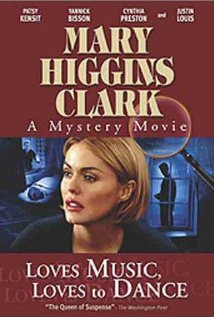
LOVES MUSIC… LOVES TO DANCE
US/Canada, 2002, 90 minutes, Colour.
Patsy Kensit, Cynthia Preston, Dean Mc Dermott, Yannick Bisson, Frank Pelegrino.
Directed by Mario Azzopardi.
Loves Music, Loves to Dance… is based on Mary Higgins Clark mystery. The filmed versions of her novels are easy-going, designed for a television audience. This is particularly the case here.
The film has a television setting, Patsy Kensit playing a producer who has encouraged her best friend to do a program on online dating. However, she was murdered. The police do their best, but Patsy Kensit insists on intervening, interviewing the men on the list of her friend, finding them sympathetic, weird, telling lies about themselves, violent… But she is charmed by one man on the list, a psychologist who is doing a project for his doctorate. Needless to say…
There is some satire on television programmes, especially the allegedly in-depth interviews on controversial issues.
On the whole, this is a slight but are entertaining murder mystery, forgotten after the final credits.
1. The popularity of the novels of Mary Higgins Clark, the television versions?
2. The American setting, the city, the world of television, apartments, restaurants, police precincts? Mansions? Popular settings?
3. The title, the focus on music, dance, the range of songs, melodies, lyrics? The title as a code for dating?
4. On-line dating, the types who put in advertisements, risks, descriptions, deceits, going to meetings? Positive and negative reactions? Consequences?
5. Patsy Kensit as Darcy, the TV producer, her associates, in the production box, the director? The talk show and Shona? The programs, the topics, her moods, the importance of the ratings? Shona and her capacity for hire and fire?
6. Darcy’s friend, from school days, the photo together? Her program, on dating, her client list, her death?
7. The introduction to the killer, the party, his victim, her rejection of his attentions, the motives? His not being seen? At home, the make-up, memories of the Phantom of the Opera, his dancing?
8. Her friend missing, Darcy and her going to the police, meeting the Detective, her pestering, their putting her off, concerned about her safety? Shona and her being upset, but prurient interest?
9. The detective, investigation, the list of clients, Darcy and her doing her detective work herself, the list, arranging the meetings, the variety of reactions, the man who was promoting himself above his status, the sympathetic psychologist and his project, the violent man and his pursuing her, the irony of the dangerous-looking man in the bars, actually a policeman and saving her? The sympathetic man but no future?
10. Darcy and Paul, sympathy, attraction, charming, going out, the meetings, his talk about his work on the project?
11. The detective, the various cases, going to the initial family, the mother upset, the brother, his type, his being a suspect? His arranging to meet Darcy?
Her being followed, his innocence?
12. Darcy’s assistant, disapproving, getting the information?
13. The police, warning Darcy, her going to her friend’s apartment, her being torn out of the photo, meeting Paul, taking her to his house, the drink, her friends ring on the floor? Paul and the make-up, wig, tuxedo, mad, his motives? The dancing, ready to kill Darcy? The police intervention? His death?
14. A satisfying Mary Higgins Clark mystery?
Published in Movie Reviews
Published in
Movie Reviews
Tagged under